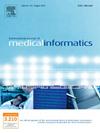Healthcare information system support for leadership and management: Experiences of Finnish physician leaders by specialty from three cross-sectional surveys in 2014, 2017, and 2021
IF 3.7
2区 医学
Q2 COMPUTER SCIENCE, INFORMATION SYSTEMS
International Journal of Medical Informatics
Pub Date : 2025-01-29
DOI:10.1016/j.ijmedinf.2025.105814
引用次数: 0
Abstract
Introduction
In addition to their role in patient care, health information systems (HISs) produce data for process and quality monitoring, resource management, and strategic planning. However, few studies have focused on physician leaders as end users of leadership and management information systems (LMISs).
Objective
The aim was to describe physician leaders’ experiences with LMISs by specialty group from three national usability-focused surveys.
Methods
The data were gathered via web-based questionnaires in 2014, 2017, and 2021 with 716, 728, and 831 physician leader respondents, respectively. The 2021 responses were compared across six specialty groups: operative, (non-surgical) medical, psychiatric, and diagnostic specialties, and general practice and occupational healthcare. Those not specialized or whose specialty was unknown formed the seventh group. Moreover, the results from the three study timepoints were compared within specialty groups.
Results
In 2021, 69.4%–84.2% indicated that they had to compile leadership and management data from several sources with 3.6%–23.7% finding this process easy. Furthermore, 3.7%–34.2% viewed that the available data supported research and innovation. Physician leaders in operative and diagnostic specialties and occupational healthcare appeared more satisfied with LMISs than did their colleagues in other specialties; for example, 41.9%–56.8% of these respondents considered that HISs help to monitor achieving the targets of their units, compared to 21.7%–34.5% in other specialties. Between the study years, the proportion of those content with LIMSs support for steering daily activities had increased, particularly in operative and medical specialties and general practice; otherwise, though overall improvements were modest.
Conclusion
Despite the wide availability of HISs and LMISs, their full potential to support physician leadership and management has not yet been fulfilled. Physician leaders working in diagnostic, operative, and occupational healthcare specialties appeared to derive the most benefit from LMISs.
医疗保健信息系统对领导和管理的支持:2014年、2017年和2021年三次横断面调查中芬兰医生领导的专业经验。
简介:除了在病人护理中发挥作用外,卫生信息系统(HISs)还为过程和质量监测、资源管理和战略规划提供数据。然而,很少有研究关注医生领导作为领导和管理信息系统(LMISs)的最终用户。目的:目的是从三个以可用性为重点的全国性调查中,按专业分组描述医师领导使用LMISs的经验。方法:2014年、2017年和2021年通过网络问卷收集数据,分别有716名、728名和831名医师领导参与调查。2021年的回应在六个专业群体中进行了比较:手术、(非手术)医学、精神病学和诊断专业,以及全科医生和职业医疗保健。那些没有专业或专业未知的人组成了第七组。此外,在专科组内比较了三个研究时间点的结果。结果:在2021年,69.4%-84.2%的人表示他们必须从多个来源收集领导和管理数据,3.6%-23.7%的人认为这一过程很容易。此外,3.7%-34.2%的受访者认为现有数据支持研究和创新。手术诊断专业和职业卫生保健专业的医师领导对LMISs的满意度高于其他专业的医师领导;例如,41.9%-56.8%的受访者认为HISs有助于监测其单位目标的实现情况,而其他专业的这一比例为21.7%-34.5%。在研究年份之间,在指导日常活动方面,特别是在外科和医学专业以及一般实践方面,那些内容中有LIMSs支持的比例有所增加;除此之外,尽管总体上的改善是温和的。结论:尽管HISs和LMISs广泛可用,但它们支持医生领导和管理的全部潜力尚未实现。在诊断、手术和职业保健专业工作的医师领导似乎从LMISs中获益最多。
本文章由计算机程序翻译,如有差异,请以英文原文为准。
求助全文
约1分钟内获得全文
求助全文
来源期刊

International Journal of Medical Informatics
医学-计算机:信息系统
CiteScore
8.90
自引率
4.10%
发文量
217
审稿时长
42 days
期刊介绍:
International Journal of Medical Informatics provides an international medium for dissemination of original results and interpretative reviews concerning the field of medical informatics. The Journal emphasizes the evaluation of systems in healthcare settings.
The scope of journal covers:
Information systems, including national or international registration systems, hospital information systems, departmental and/or physician''s office systems, document handling systems, electronic medical record systems, standardization, systems integration etc.;
Computer-aided medical decision support systems using heuristic, algorithmic and/or statistical methods as exemplified in decision theory, protocol development, artificial intelligence, etc.
Educational computer based programs pertaining to medical informatics or medicine in general;
Organizational, economic, social, clinical impact, ethical and cost-benefit aspects of IT applications in health care.
 求助内容:
求助内容: 应助结果提醒方式:
应助结果提醒方式:


